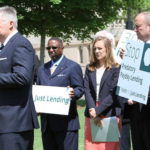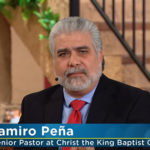BETHESDA, Md. (RNS)—In the span of just a few months, Jerry DeWitt went from a respected pastor with a vibrant congregation to an atheist without a job.
DeWitt, 42, is the first "graduate" of The Clergy Project, a program supported by several atheist organizations that assists pastors who have lost their faith to "come out" as atheists to family, friends, congregations and communities.

Jerry DeWitt, a former Pentecostal preacher, came to be an atheist while still preaching in the pulpit.
|
DeWitt, who lives in southern Louisiana, went public last October when he posted a picture of himself with the prominent and polarizing atheist Richard Dawkins, snapped at a meeting of atheists and other "freethinkers" in Houston.
Speaking in March before a cheering crowd of several hundred unbelievers at the American Atheists conference, he described posting the picture as "committing identity suicide."
The response was swift. His congregation put him out, friends cut him off and some family members will not speak to him, he said.
"It is not just finances, and it is not just career," he said in the fire-and-brimstone cadences of his Pentecostal background. "It is everything that you hold dear."
But there are gains, too, he insisted. "With a little help from my friends, I have learned how to do more than survive," he said.
DeWitt's transition from true believer to total skeptic took 25 years. It began, he said, with the idea of hell. How could it be, as he had been taught and preached, that a loving God would damn most people to eternal fire? "This thing called hell, it began to rock my world," he said.
Sign up for our weekly edition and get all our headlines in your inbox on Thursdays
From there he read about universalism—the idea that salvation is universal, and all people will be restored in their relationship with God without any action on their own part. After universalism, he discovered the idea, supported by some neuroscientists, that God is actually our inner dialogue.
"I went from God loves everybody to God saves everybody to God is in everybody," he said. "When you come from where I come from, … it's not too long before you are" at the American Atheists convention.
His new beliefs—or lack of them—were kept secret from friends, family and his congregation. And they were put to the test when a friend in crisis asked him to pray with her.
"I could not do it," he said. "At that moment, my conscience outweighed everything else in my life. … No matter how much I loved her, I knew the best hope for her situation was a good medical staff, and I wasn't going to pretend there was anything better for her than science and reason."
His heart, he said, was "absolutely, totally broken." He described gazing at himself in a mirror and realizing "that if I could not pray for her that I would never pray for anyone or anything ever again."
It was then that he found The Clergy Project, plugging into its anonymous online support groups and forums. That was in May 2011.
"I was amazed that there were people out there wrestling with the same issues I was," he said. "And I began to work my way out with a little help from my friends."
Today, DeWitt is the executive director of Recovering From Religion, a group that professes to help people find their way after a loss of faith.
"Not only can you survive, but you can thrive through this process," he insisted.













We seek to connect God’s story and God’s people around the world. To learn more about God’s story, click here.
Send comments and feedback to Eric Black, our editor. For comments to be published, please specify “letter to the editor.” Maximum length for publication is 300 words.